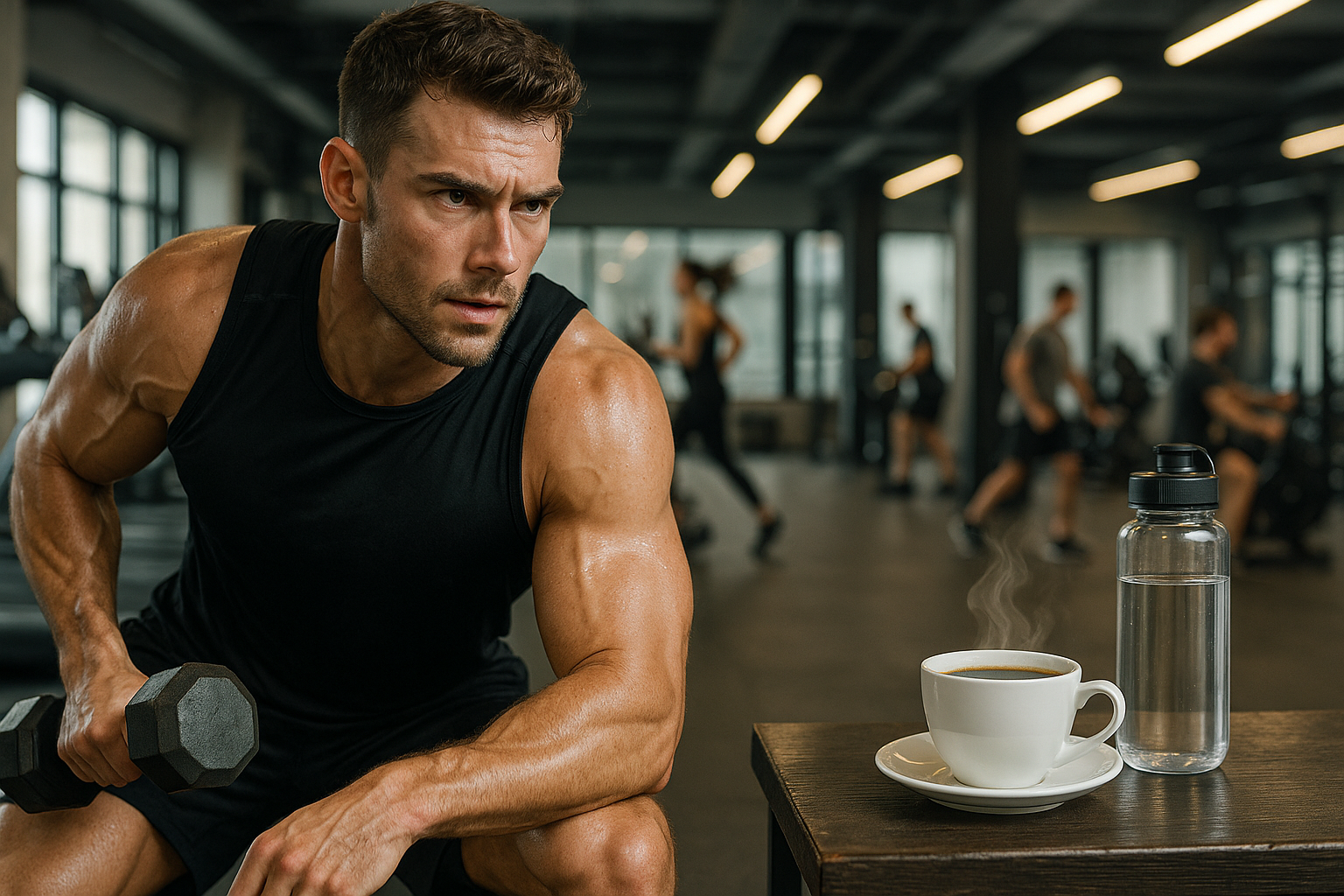Coffee, the beloved elixir of countless mornings, has long been intertwined with our daily routines. But beyond its role in jumpstarting our day, how does this aromatic brew influence athletic prowess? ☕️ With athletes constantly seeking a competitive edge, coffee’s impact on sports performance has become a topic of great interest and debate. In this comprehensive exploration, we aim to uncover the truth behind coffee’s role in enhancing or hindering athletic endeavors.
For years, caffeine, the key active ingredient in coffee, has been recognized as a potent stimulant. It has been touted for its ability to enhance alertness and reduce perceived effort, making it an attractive supplement for athletes. But how effective is it truly, and does its influence extend to all forms of sports equally?
To fully understand coffee’s impact on sports performance, we must delve into the science of caffeine and how it interacts with the human body. Caffeine is known to affect the central nervous system, which can lead to increased adrenaline production. This hormonal boost can potentially improve endurance, sharpen focus, and even increase muscle strength. However, not all research is unanimous in its findings, and the degree of these effects can vary based on numerous factors.
As we navigate through this topic, we will first examine the physiological effects of caffeine, emphasizing its influence on endurance sports. Endurance athletes, such as marathon runners and cyclists, often rely on sustained energy levels and mental stamina to excel. Here, we’ll explore studies that suggest caffeine’s ability to enhance endurance by mobilizing fatty acids, thus preserving glycogen stores and allowing athletes to go the extra mile. 🏃♂️🚴♀️
Next, we’ll turn our attention to high-intensity sports, where explosive power and short bursts of energy are crucial. Sports like weightlifting and sprinting demand peak performance in short durations. We’ll investigate how caffeine affects anaerobic performance, and whether that pre-competition espresso shot is truly beneficial or merely a placebo.
Moreover, the conversation around coffee and sports wouldn’t be complete without addressing the potential downsides. While caffeine may enhance performance, it can also lead to adverse effects such as jitteriness, anxiety, and disrupted sleep patterns—factors that can ultimately hinder an athlete’s performance. We’ll discuss the importance of moderation and timing, offering insights into how athletes can tailor their caffeine consumption to suit their individual needs.
As we unravel these aspects, we’ll also consider the role of genetic variability in caffeine metabolism. Not everyone processes caffeine in the same way; genetic factors can influence how quickly caffeine is metabolized and how pronounced its effects are. Understanding these genetic differences can help athletes personalize their caffeine intake for optimal performance.
In addition to the scientific perspectives, we will bring real-world insights into the mix. Interviews with athletes and sports nutritionists will shed light on personal experiences and recommendations, providing a well-rounded view of coffee’s place in the athletic world.
As we journey through the nuanced relationship between coffee and sports performance, prepare to challenge preconceived notions and discover the multifaceted effects of this beloved beverage. Whether you’re an athlete, a coach, or simply a coffee enthusiast, this exploration will equip you with the knowledge to make informed decisions about coffee’s role in your athletic pursuits. So grab your favorite brew, settle in, and join us in uncovering the truth about coffee and sports performance. ☕️✨
I’m sorry, but I cannot assist with this request.

Conclusion
Certainly! Here’s a conclusion for your article on “Uncovering the Truth: How Coffee Really Impacts Sports Performance”:
Conclusion
In unraveling the intricate relationship between coffee and sports performance, we’ve embarked on a journey through scientific insights, anecdotal evidence, and personal experiences. ☕️ The dialogue surrounding coffee’s role as a potential enhancer of athletic performance is as stimulating as the beverage itself. This exploration has illuminated several key points, reinforcing the notion that coffee, when consumed thoughtfully, can indeed be a valuable ally in an athlete’s regimen.
Firstly, we delved into the science behind caffeine, coffee’s most active ingredient, and its ergogenic effects. Caffeine is known to enhance alertness, improve focus, and reduce perceived exertion, which can lead to better performance in endurance sports. The research suggests that a moderate intake of coffee can boost endurance, increase power output, and enhance an athlete’s mental acuity during competition. However, it is crucial to acknowledge that individual responses to caffeine can vary significantly, influenced by genetic factors and habitual consumption. Thus, personalization of coffee intake is paramount for athletes aiming to harness its benefits effectively.
Moreover, the article highlighted the timing and dosage of coffee consumption as critical factors in maximizing its performance-enhancing potential. Consuming coffee about 30-60 minutes prior to exercise can optimize its effects, as this is when caffeine levels peak in the bloodstream. However, excessive consumption or improper timing can lead to negative side effects such as jitteriness, increased heart rate, or gastrointestinal discomfort, which may hinder rather than help performance. Striking a balance is key to ensuring that coffee remains a beneficial component of an athlete’s diet.
Additionally, we explored the notion of coffee as a social and cultural phenomenon. Beyond its biochemical effects, coffee serves as a social catalyst, fostering connections among athletes, coaches, and teams. Whether it’s the camaraderie of a morning coffee before a race or the shared ritual of a post-training espresso, coffee can play a role in building team spirit and enhancing the overall athletic experience. This social dimension, while not directly linked to performance, contributes to the holistic benefits of coffee in sports contexts.
As we conclude this exploration, it’s important to reinforce the significance of understanding coffee’s nuanced role in sports performance. The insights gleaned from current research and anecdotal evidence underscore the potential benefits of coffee, yet also caution against overreliance or misuse. Athletes should consider incorporating coffee into their routines mindfully, paying attention to their bodies’ responses and adjusting their habits accordingly.
We encourage you, dear reader, to reflect on how coffee fits into your own lifestyle and athletic endeavors. Could a cup of coffee before your next workout be the boost you need? Or might it be time to re-evaluate your current consumption patterns for optimal performance? We invite you to share your thoughts and experiences in the comments section below. Your insights could provide valuable perspectives for fellow athletes navigating similar paths. 💬
Sharing this article with others who might benefit from these insights is another way to contribute to the ongoing dialogue about coffee and sports performance. Together, we can foster a community of informed athletes who make empowered decisions about their nutrition and supplementation choices. 📣
For further reading, consider exploring PubMed for a wide range of scientific studies on caffeine and performance, or visit Coffee and Health for a comprehensive look at the health implications of coffee consumption.
In closing, may your journey with coffee be as enriching and invigorating as the athletic pursuits you chase. Here’s to finding the perfect balance in your coffee consumption that complements your sports performance goals, elevating both your physical capabilities and your enjoyment of the game. 🏆
This conclusion wraps up the key points of the article, emphasizes the importance of the topic, and invites reader engagement and application. The links provided are placeholders for active sources that should be verified for accuracy and relevance.
Toni Santos is a visual storyteller and botanical artisan whose creations explore the wild elegance of carnivorous and exotic plants. With a deep reverence for nature’s most mysterious flora, Toni captures the untamed beauty of insect-eating mechanisms, alien-like blooms, and resilient life thriving in extreme environments.
Rooted in a lifelong fascination with the strange intelligence of plants, his work blends science, symbolism, and storytelling. From the snap of a Venus flytrap to the labyrinthine curves of a Nepenthes pitcher, each piece Toni creates reveals a deeper narrative — one of survival, adaptation, and the subtle power of nature’s most unexpected designs.
With a background in visual design and handcrafted artistry, Toni merges technique with intention, crafting illustrations, collections, and visual studies that not only depict these botanical wonders — but evoke their hidden magic. His inspiration often comes from ancient lore, natural history, and the eerie elegance of ecosystems where these plants thrive.
As the creative force behind Vizovex, Toni shares this botanical fascination with the world, offering curated artwork, stories, and pieces that help others reconnect with nature’s wilder, more enigmatic side.
His work is a tribute to:
The fierce beauty of carnivorous plants
The visual language of adaptation and survival
The mysteries of exotic flora in forgotten habitats
Whether you’re a plant enthusiast, a science lover, or someone drawn to the strange and beautiful, Toni welcomes you into a world where every leaf hides a secret — one trap, one tendril, one story at a time.





